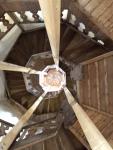One of the challenges of Lent for Christians is to avoid confusing process with event.
That is a shorthand way of saying that the stories we read in the scriptures cover a period of time, and we need to try to live with the narrative, not conflate it.
So, for example, the people to whom Isaiah addressed his writings three thousand years ago did not know the middle or end of their story. Those who were warned that exile might well be coming (Isaiah 1-39) didn’t know what that exile would mean in reality. Which is probably why they went into denial and didn’t take the threat seriously. Those who went into exile in Babylon experienced existential (as well as physical and material) loss, but they would soon have to come to terms with a new reality. Nostalgia wouldn’t help, nor would wishful thinking.
But, they also had no idea how long exile would last. There was no template for how to live in the strange land, with its different routines, languages, expectations, limitations, and so on. Even the immediate future was uncharted territory. We know what happened over the following decades, but they didn’t. So, they had to work it out as they went along, never sure they were reading the times right or not.
Sounds familiar?
We need to use our imagination to dig beneath the text. If you were born at the beginning of exile, you might have some memory of ‘home’. But, if you had grown up into your mid-adulthood in exile, exile is normal. What then of the memory of a home you didn’t know? So, how do you live, but also how do you think about how you live?

A reading of the ancient texts tells us that we always need to expand our concept of time. The exiles were in for the long haul. Generations might be born, live and die in exile. Their grandchildren and their grandchildren might know no other reality.
So, the question remains: does our confidence – our faith – lie in a set of personally positive circumstances or some equation for securing a future? Or does it lie in a conviction that transcends the immediate good or ill that being human necessarily brings us? In Christian terms, does my faith lie in a formula … or in the person of the God who takes a longer view and, as we will re-live at Easter, defies death itself?
